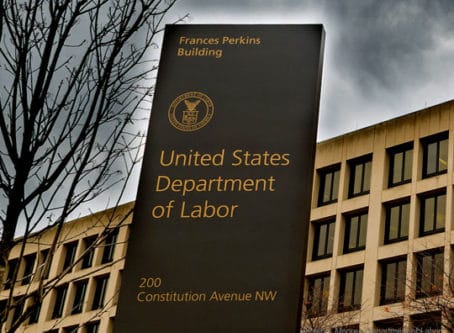
Tascha Shahriari-Parsa is a government lawyer enforcing workers’ rights laws. He clerked on the Supreme Court of California after graduating from Harvard Law School in 2024. His writing on this blog reflects his personal views only.
In today’s news & commentary: DOL rulemaking on employee retention for changing federal contractors; pro-labor amendments passed in a House Defense bill; and both celebrations and limitations of a DOL policy offering protections to undocumented workers who file certain labor law complaints.
Today, the DOL issued a notice of proposed rulemaking (NPRM) for a rule that would, in cases where a new federal contractor replaces an old one, facilitate the re-employment of the former contractor’s employees. The rule would require federal “contractor[s] and subcontractor[s] to offer qualified employees under the predecessor contract a right of first refusal of employment under the successor contract.” The rule follows Biden’s Executive Order 14055 from last November, which noted that “the Federal Government’s procurement interests in economy and efficiency are best served when the successor contractor or subcontractor hires the predecessor’s employees, thus avoiding displacement of these employees.” The NPRM was applauded by the AFL-CIO for “keep[ing] skilled workers in their jobs,” among other things.
Yesterday, as the House of Representatives passed the National Defense Authorization Act (H.R. 7900) for the current fiscal year, the bill included a number of pro-labor amendments—though the bill has yet to make it through the Senate. The broadest of these amendments would prohibit all agencies from using a federal contractor that has violated the Fair Labor Standards Act twice or more in the preceding five years. Another amendment asks the Labor Department to solidify procedures for investigating violations of the “ban the box” law that has applied to federal contractors since last December—which precludes inquiry into applicants’ criminal histories prior to conditional job offers. Other amendments are specific to the Department of Defense (DOD): One precludes the DOD “from contracting with any employer found to have engaged in an unfair labor practice, defined by Section 8(a) of the National Labor Relations Act (NLRA), in the three years preceding a contract award date,” with an “exception for employers who have remedied unfair labor practice violations.” Another gives preference to DOD contractors who have entered into neutrality agreements with unions and who have agreed not to replace striking workers.
Workers’ rights organizations have celebrated the DOL’s recent policy to offer protections to undocumented workers who file labor complaints, though the policy comes with some important caveats. As laid out in an FAQ-style document, the policy asks workers to email DOL if they are involved in a DOL-related workplace dispute and wish to seek protection from the Department of Homeland Security (DHS), in order to prevent immigration-related retaliation from managers. The hope of the policy is that it will encourage more undocumented workers to come forward with labor law violations as their fears of deportation can be, at least temporarily, assuaged. “Workers that never wanted to come forward because they were afraid can [now] come out of the shadows,” said Jose Frausto of the Chicago Workers Collaborative. “This opens the door for undocumented workers to be able to fight for the right to be respected in the workplace.”
The policy promises important benefits for undocumented workers, who can now receive some reassurance that their manager will not be able to punish them for reporting labor law violations by taking advantage of their immigration status. However, it is important to point out a couple of the limitations of the DOL policy which have not always been reported clearly. First, under the policy, the DOL itself has no authority to grant relief from immigration enforcement; the DOL can at best only offer a “Statement of DOL Interest” which the worker can then forward to the DHS (or the DOL may forward it to the DHS themselves), to in turn ask the DHS to use its discretion to refrain from prosecuting the worker who filed the complaint. Second, the DOL’s provision of a statement of interest is by no means automatic—they will first consider a list of weighted factors before determining whether to send the request to the DHS, a decision which is ultimately “wholly discretionary.” The combination of these two facts means there is likely a fair bit of uncertainty and delay from when a request is made to the DOL to any DHS decision to decline enforcement.
Third, it’s worth noting that the policy only covers labor disputes “related to the laws enforced by the DOL.” Thus, while the policy may help protect employees who engage in wage and hour, workplace safety, or other employment-law claims, the DOL will likely not involve itself in communications to the DHS for undocumented workers involved in union organizing or other protected NLRA activities, or where workers accuse their employer of committing unfair labor practices. The Board should issue guidance matching that of the DOL: where NLRA-related labor disputes are taking place, the Board could similarly implement a process in which it can receive requests by workers and unions to in turn ask the DHS to decline enforcement of immigration laws .






Daily News & Commentary
Start your day with our roundup of the latest labor developments. See all
February 11
Hollywood begins negotiations for a new labor agreement with writers and actors; the EEOC launches an investigation into Nike’s DEI programs and potential discrimination against white workers; and Mayor Mamdani circulates a memo regarding the city’s Economic Development Corporation.
February 10
San Francisco teachers walk out; NLRB reverses course on SpaceX; NYC nurses secure tentative agreements.
February 9
FTC argues DEI is anticompetitive collusion, Supreme Court may decide scope of exception to forced arbitration, NJ pauses ABC test rule.
February 8
The Second Circuit rejects a constitutional challenge to the NLRB, pharmacy and lab technicians join a California healthcare strike, and the EEOC defends a single better-paid worker standard in Equal Pay Act suits.
February 6
The California Supreme Court rules on an arbitration agreement, Trump administration announces new rule on civil service protections, and states modify affirmative action requirements
February 5
Minnesota schools and teachers sue to limit ICE presence near schools; labor leaders call on Newsom to protect workers from AI; UAW and Volkswagen reach a tentative agreement.